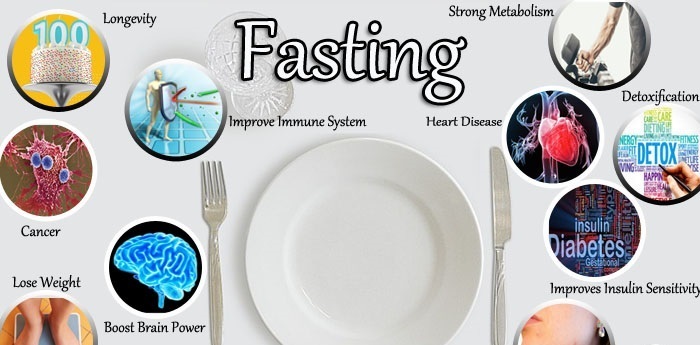5 Health Benefits of Fasting You May Have Never Heard Of!

This write-up takes a critical look at fasting from a health perspective by looking at 5 Health Benefits of Fasting You May Have Never Heard Of!
If you’ve ever tried to “get healthy” or “start a new diet,” you know that there are seemingly endless options out there. The world of nutrition is filled with fads and trends, and it can be hard to know which advice is trustworthy and which isn’t. Fortunately, many of the practices we see come again and again are rooted in sound science, not just marketing ploys. Fasting is one of those practices that has been validated again and again by medical researchers as both safe and beneficial for human health. Read on to learn more about the benefits of fasting and how fasting can help you reach your health goals!
Fasting for Weight Loss
Research has shown that fasting can help with weight loss because it naturally reduces the amount of calories your body takes in. When you don’t consume any food (or only consume very little), your body goes into “starvation mode” and burns fewer calories than usual. This makes it easier to lose weight without having to change your diet drastically. In fact, many people who fast regularly find that they eat less than usual because their bodies naturally feel fuller with less food. When combined with exercise, regular fasting can help you lose even more weight and reach your health and fitness goals. However, fasting is not a replacement for a healthy diet. You can still get many essential nutrients from a fast, but you will have to supplement with vitamins and minerals. And it’s important that you don’t eat too little or you could put yourself at risk for nutritional deficiencies and several other health problems.
Fasting for Improved Brain Health
The health benefits of fasting go beyond just weight loss. Studies have shown that fasting can have powerful positive effects on the brain, including improvements in mood and cognition. Many people who experience mood disorders like anxiety and depression also report reduced symptoms when they fast. Researchers believe that fasting can enhance brain health in several different ways. First, fasting triggers a process called autophagy, which literally means “self-eating.” When autophagy occurs, your body breaks down and recycles old and damaged cells, including brain cells. This can help reduce risk of diseases like Alzheimer’s and other degenerative neurological conditions. Fasting has also been shown to reduce levels of insulin, a hormone that’s common among people with anxiety disorders. This can help reduce symptoms like anxiety, stress, and mood swings. Fasting has also been shown to reduce levels of insulin, a hormone that’s common among people with anxiety disorders. This can help reduce symptoms like anxiety, stress, and mood swings.
Fasting for Cardiovascular Health
As mentioned above, fasting triggers the process of autophagy, which literally means “self-eating.” When autophagy occurs, your body breaks down and recycles old and damaged cells, including cells in the heart and blood vessels. This can help reduce risk of diseases like atherosclerosis (a type of heart disease) and other degenerative heart conditions. Fasting has also been shown to reduce levels of CRP, a marker of chronic inflammation that’s common among people with heart disease. This can help reduce symptoms like high blood pressure, which is one risk factor for heart disease. One other potential benefit of fasting for your heart is reduced blood pressure. A few small studies have shown that fasting can temporarily lower blood pressure in people with hypertension.
Fasting to Fight Inflammation
Every day, your body fights off infection and destructive free radicals. This is called “inflammation,” and it’s a normal part of the human immune system. But if it becomes chronic, inflammation can have harmful health effects. Fasting has been shown to reduce CRP, a marker of chronic inflammation that’s common among people with heart disease. This can help reduce symptoms like high blood pressure, which is one risk factor for heart disease. Fasting has also been shown to reduce levels of insulin, a hormone that’s common among people with anxiety disorders. This can help reduce symptoms like anxiety, stress, and mood swings. One other potential benefit of fasting for your heart is reduced blood pressure. A few small studies have shown that fasting can temporarily lower blood pressure in people with hypertension.
Fasting to Protect the Environment
Fasting is a great way to protect the environment because it has almost no impact on the planet. In fact, the only resources you have to spend are internal: your time, effort, and mental energy. Unlike most other health practices, fasting has almost no impact on the environment. You don’t have to drive to the gym or purchase any special equipment. You don’t have to drive to the store to buy ingredients for special recipes or spend money on supplements. Fasting requires no special effort from the environment. You don’t have to drive to the gym or purchase any special equipment. You don’t have to drive to the store to buy ingredients for special recipes or spend money on supplements.
Fasting can help you reach your health goals and it has a lot of benefits along the way!
Fasting is an excellent tool to aid in weight loss and help improve your brain health. It can also reduce inflammation and protect the environment. All this and more make fasting a powerful practice that can help you achieve your health goals!
READ: The Spiritual War Tool: Fasting And Its Benefits
Conclusion
Fasting is an ancient practice that’s become more popular in recent years. And the health benefits of fasting go beyond just weight loss. Fasting has been shown to reduce levels of insulin, a hormone that’s common among people with anxiety disorders. This can help reduce symptoms like anxiety, stress, and mood swings. Fasting has also been shown to reduce levels of CRP, a marker of chronic inflammation that’s common among people with heart disease. This can help reduce symptoms like high blood pressure, which is one risk factor for heart disease. Fasting has also been shown to reduce levels of IGF-1, a hormone that’s common among people with certain cancers like breast and prostate cancer. This can help reduce the risk of these diseases.







